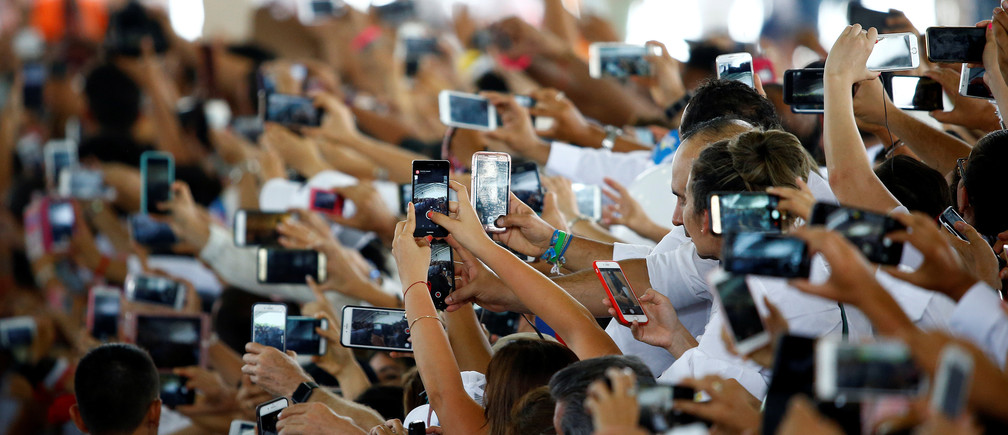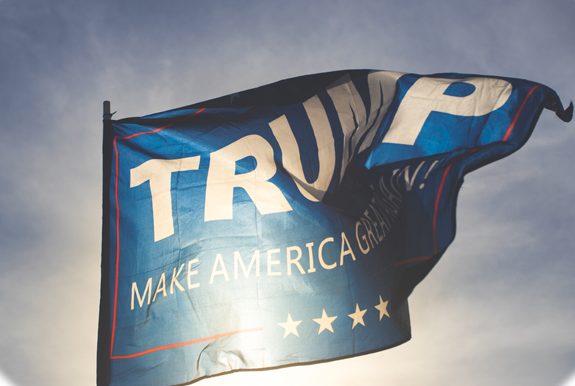Democracy and despotism in a digital age.
The Real Dangers, and Promise, of Digital Campaigning

The Left is incapable of answering—or asking—the looming question.
Trump’s reelection chances must be better than I thought.
Earlier this month at The Atlantic, McKay Coppins published an 8,000 word deep-dive into the president’s 2020 digital campaign operation, “The Billion-Dollar Disinformation Campaign to Reelect the President.” The tone of Coppins’s article is, in a word, alarmist—and given the article’s popularity, lots and lots of people seem to agree with him.
Personally, I’m skeptical of the premise that disagreeing with the media consensus, which in the Trump era has gone from being regularly wrong to grotesquely so, necessarily means you’re spreading disinformation. However, if we’re simply concerned about the toxicity of politics on the internet, well, I’m here for that. Perhaps we should start with why it took the media so long to decide this was a problem.
The Power of Friendship
In 2008, Obama ran the first real “online” campaign, which wasn’t just important as a matter of innovation—it was at least as important as cultural signifier.
Obama was all over YouTube and the still nascent social networks, even as his campaign ran ads attacking his septuagenarian opponent for not knowing how to use a computer. McCain had difficulty typing because of his war injuries, but if the point was to say he was out of touch, we got the message.
Still, it took the media a few years to catch up to the new reality of campaigns driven by computers. It wasn’t until his reelection in 2012 that the press became obsessed with stories on the impact of social media and new technologies on political campaigns.
Even for politician twice swept into office by a tsunami of unjustifiably triumphal B.S., the coverage then was a high watermark. A not atypical Guardian headline in 2012 was “Obama, Facebook and the power of friendship: the 2012 data election.” Facebook had grown exponentially since 2008, and with no apparent sense of irony, the venerable left-wing paper was eager to report that a “unified computer database that gathers and refines information on millions of potential voters is at the forefront of campaign technology—and could be the key to an Obama win.”
The Obama campaign actually opened a Silicon Valley field office to tap into all the tech expertise that was rushing to help his campaign. For years, programmers and videogame designers had been finding creative ways to exploit peer pressure and dopamine spikes to get people to open their wallets—getting them to the voting booth seemed like a comparatively easy task.
Facebook, though, was just the beginning. Also in 2012, Sasha Issenberg wrote The Victory Lab: The Science of Winning Campaigns about the “cutting edge persuasion experiments, innovative ways to mobilize voters, and statistical models predicting the behavior of every voter in the country.” It quickly became clear that what was going on was far more concerning than campaigns merely adapting to the smartphone era. No one was even hiding the fact these experiments might involve fomenting division on purpose or simply messing with people’s heads.
The Obama campaign was free to experiment because they were virtually immune from criticism.
They released an app that anyone could download to help Obama voters canvass their neighborhoods. That anyone could ask for and receive detailed information on their neighbor’s partisan affiliation, and then was encouraged to knock on their doors and instantly record their feelings about the president into an electronic database, didn’t seem to be cause for concern. The New York Times called the app the “the science-fiction dream of political operatives” and said “the campaign is betting that the technology will vastly expand the number of supporters who will beat the pavement for Mr. Obama.”
The “cutting edge persuasion experiments” were also concerning, if not always successful. In a desperate flip-of-the-script after the president’s signature health care law had become the public policy equivalent of a flaming dirigible, the campaign started a social media trend that involved celebrities and notable supporters taking a sharpie and writing “Obama” on one hand and “care” on the other. You were then supposed cross your hands and post a photo on social media.
The whole thing died a merciful death when Obama campaign manager Jim Messina tried to participate. Messina is by all accounts a nice guy, but something about his picture went very wrong—it turned out so creepy that the photo felt incomplete without a thought bubble over his head reading “it puts the lotion in the basket.” The ensuing online mockery effectively killed the Obama campaign’s weird attempt to use peer pressure to associate Obamacare with something other than incompetence.
Still, watching all this unfold made me feel like I was taking crazy pills. How was this Orwellian and manipulative garbage not only tolerated, but celebrated? I wrote a blog post outlining my concerns a few months ahead of the election that I headlined, “Democracy is Not a Psychology Experiment.” Based on the feedback I got, it was read by almost no one, or at least no one who cared.
I sent the piece to a friend of mine who is, by the by, a heavyweight GOP campaign consultant. “Aren’t you worried about what the Obama campaign is doing to get reelected?” He shrugged and said, “Nah, the Right just has to get good at this stuff.”
And so they did. That’s when all hell broke loose.
WTF, I Hate the Internet Now
Not long after Obama’s reelection in the “data campaign,” Steve Bannon and conservative billionaire Robert Mercer decided they needed a data company to call their own. Cambridge Analytica started collecting Facebook data for their own “unified computer database that gathers and refines information on millions of potential voters.”
There’s been a subsequent controversy about whether Cambridge Analytica acquired the Facebook data they used to help elect Trump in a way that was deceptive and possibly illegal. (There’s a very slickly produced documentary on Netflix that will give you the sinister take on what they did.) But it’s also true that the Obama campaign acquired millions of Facebook users’ data without their consent as well, and may have even used the same tools as Cambridge Analytica to do it.
Regardless, we can confidently gauge the disparate reception of the two campaigns. In 2012, the Obama campaign sucked up all the data on Facebook and was greeted with a chorus of hosannas for their tech-savvy electioneering. In 2016, the Trump campaign also raided Facebook’s data, and—to hear the press tell it—the sky started falling. Throw in the fact that the Russians bought a few hundred thousand dollars’ worth of election ads on Facebook, and the media was convinced that the democracy’s apocalypse—the democalypse!—really was at hand.
The arc of history is indeed long, and when it did not bend toward Hillary Clinton, the entire American press corps coalesced around the idea that Trump colluded with Russia to steal an election. After watching Robert Mueller suffer through his congressional testimony with all the sentience of a man desperate to get home in time to enjoy some applesauce and Law and Order re-runs, we’ve got a pretty good idea how that theory panned out.
And if the Trump campaign didn’t actually do anything to subvert the will of the people, it might be fair to say that we have a pretty good idea of what really has undermined faith in the system: Three years of respectable media outlets such as The Atlantic—sorry McKay! —disappearing so far into their own posterior it’s a wonder how they were able to bang out all of those Russia collusion stories in such moist and cramped working conditions.
Now don’t get me wrong, the commingling of politics and the internet is still the chocolate and peanut butter of terrifying human behavior. But there is a clear argument that Trump’s election, and specifically his digital campaign, was a positive development for democracy.
While the previous Obama campaigns were lauded for their shrewd use of technology, the Obama campaign had all the resources they could ever use leftover to run a conventional campaign. At the same time Obama was becoming a financial juggernaut—his 2012 campaign was the first to ever raise a billion dollars—campaign finance reform and insincere warnings about rich people and corporate interests buying elections became de rigueur Democratic party rhetoric.
And so in 2016, we were treated to the spectacle of a Democratic presidential candidate, fresh off of collecting six-figure speaking fees from Goldman Sachs, railing against the Citizens United verdict at every opportunity. Whatever you think of the need for campaign finance laws, the particular facts of the case meant a uniquely Clintonian chutzpah was required for Hillary Clinton to condemn the Supreme Court for failing to make it illegal to show a film criticizing…Hillary Clinton. The icing on the cake was that Clinton brayed about all of this while outspending her Republican opponent in the race nearly two to one, even as nearly everyone assumed she was cruising to an easy victory.
If you buy the idea that Trump’s digital campaign was very effective, if ruthlessly so, his victory despite being so dramatically outspent should have been good news in one important sense. New technologies were leveling the playing field, such that Trump could get his message out and mobilize his voters without needing to burn piles of money on more traditional and more expensive forms of campaigning, such as TV ads. However, this also meant bypassing the gatekeeping functions of the mainstream media: depriving them of ad revenue and not being subject to their interpretative whims and biases when it came to getting your message out.
Of course, it’s genuinely hard to tell how good Trump’s digital campaign was, given how much of a bogeyman the press has made it into. There are simpler explanations for his victory that don’t involve a Putin-Bannon-Zuckerberg cabal subliminally creating an army of Manchurian voters.
Consider this outlandish possibility: What if voters liked what Trump was saying? His message was consistent and so bone simple it could be reduced to seven words: “Make America Great Again” and “Build a Wall.”
The former phrase was an acknowledgment that for all the orgiastic encomiums to the greatness of the Obama era, a lot of Americans, even many who voted for him, still felt screwed by the direction of the global economy (and were perhaps put off by Obama’s disdain for the notion of American exceptionalism).
As for the latter, a fact recorded in Chris Caldwell’s recent book The Age of Entitlement stopped me cold. “In the three-and-a-half centuries between its discovery and 1965, the United States had received 43 million newcomers (including a quarter-million slaves),” Caldwell writes. “In the half-century that followed…it would get 59 million.”
Perhaps we should consider the possibility that so much unfettered immigration in such a short time period has created way more political, cultural, and economic upheaval than anyone on the political stage had previously acknowledged? And perhaps it’s not surprising such a message would resonate, particularly in areas of the country that were strategically important for a national election?
Further, can we admit that calling people who had concerns about this “deplorable,” “irredeemable,” and “racist” was the absolute worst way to respond? Trump voters, with their truck-stop haberdashery and opiate addictions, may have been downmarket. But as fellow Americans, they did not deserve to be deprecated.
However, for this explanation to be acknowledged and have a salutary effect on national discourse, it would require the press and the Democratic party—but I repeat myself—to do some real self-reflection and confess they were wrong about some things. As such, I expect this will happen some time between never and the Ragnarok.
Gaming the System
In the meantime, we have 8 months of dire warnings about the Trump campaign ahead of us, and they’re coming straight from the top.
Last week, former president Barack Obama tweeted out a link to Coppins’ story, and if you were hoping that this was the moment the tide of hypocritical rhetoric began to recede, no such luck: “Even if the methods are new, sowing the seeds of doubt, division, and discord to turn Americans against each other is an old trick. The antidote is citizenship: to get engaged, organized, mobilized, and to vote—on every level, in every election.”
I don’t know what the Trump camp has up their sleeve, and if you want to argue that Trump’s hyperbole, dishonesty, and confrontational rhetoric as filtered through a well-funded presidential campaign poses a serious problem heading into November, feel free to insert the ritual maledictions here. However, it would be a lot more useful if Obama could tell us something about what exactly is going on with the Democratic primary happening right now.
If you’re keeping score, Buttigieg, the candidate who lost the popular vote in Iowa, ended up with more delegates than the winner. Then in New Hampshire Buttigieg lost the popular vote again but still ended up with the same number of delegates as the person who got more votes.
When Bernie Sanders ran as a Democrat last time around, it was near universally accepted that in ways big and small, the party rigged the election to disenfranchise their voters and empower Hillary Clinton.
And since speculating about wild electoral conspiracies is a thing the press is allowed to do now, do you know who sits on the board of Acronym, the company that owns Shadow, which made the app that famously crashed and all but made it impossible to determine the results in Iowa? Well, it would put a nice button on things to tell you it’s Jim Messina, but in reality it’s David Plouffe—Obama’s other campaign guru.
But wait, there’s more! Apparently, the co-founder of Acronym is married to a Buttigieg strategist, and Shadow has recently been paid to work for the Buttigieg and Biden campaigns. If I didn’t know better, this all looks like the Democratic party is doing a fine job of “sowing the seeds of doubt, division, and discord”—and their Republican opponent isn’t even campaigning in earnest yet.
As American elections continue to vacillate between tragedy and farce, you have to wonder if the media, with its obsessive focus on personalities and horseraces, is even asking the right questions about how the internet shapes our toxic politics. There are myriad ways that the people running Google and Amazon have a more direct impact on our lives than the President of the United States. (It doesn’t help that Jeff Bezos also owns the Washington Post.)
Percy Shelley famously called poets “unacknowledged legislators” for their ability to shape the way people think. A 19th century romantic, he undoubtedly saw this as a positive influence. In the 21st century, we should probably acknowledge that computer code is the “unacknowledged legislation” of our era. But I don’t think anyone is especially hopeful about it anymore.
We can all read poetry, but the way code spins into complexly engineered platforms that shape our lives and allow some to gain competitive advantage over others is inscrutable to most of us. And that’s assuming we even have the self-awareness to ask how it might be harming our ability for self-governance.
A close look at Coppins’s article—and the host of others like it that will undoubtedly be published in the months to come—will reveal that, for all their alarmist talk, the Left and our political class lacks this self-awareness. They either wildly demonize technology in the hands of their opponents or mindlessly praise it when deployed by their own team.
If those in politics who care about the Republic truly want to save it, they need to start thinking harder about statecraft in a digital age and stop obsessing over shadowy conspiracies about who’s digitally manipulating who.
The American Mind presents a range of perspectives. Views are writers’ own and do not necessarily represent those of The Claremont Institute.
The American Mind is a publication of the Claremont Institute, a non-profit 501(c)(3) organization, dedicated to restoring the principles of the American Founding to their rightful, preeminent authority in our national life. Interested in supporting our work? Gifts to the Claremont Institute are tax-deductible.
In 2010, Claremont Institute Senior Fellow Angelo Codevilla reintroduced the notion of "the ruling class" back into American popular discourse. In 2017, he described contemporary American politics as a "cold civil war." Now he applies the "logic of revolution" to our current political scene.
Claremont Institute Senior Fellow John Marini is one of the few experts on American Government who understood the rise of Trump from the beginning of the 2016 election cycle. Now he looks to the fundamental question that Trump's presidency raises: is the legitimacy of our political system based on the authority of the American people and the American nation-state, or the authority of experts and their technical knowledge in the service of "progress"?




